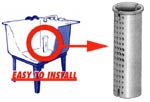30-Second Word Whoop: “Trap”

Remember the board game “Booby-Trap” from the Sixties-Seventies? If you do, you may have a mind like a steel trap. (Photo courtesy of Phil Romans, Flickr)
“It looks like a trap!”
“Shut your trap.”
“He bears the trappings of a fool.”
None of these machinations of “trap” is an open-shut case. First off, identifying a trap would defuse its power. In case two, your free will defies such a command. In the third usage, the meaning is “disguised”: Trappings might say one thing and reveal another.
 Sometimes a trap is a good thing. A lint trap protects your dryer. A sink trap protects your plumbing. A U-shaped or S-shaped pipe can protect you by trapping harmful gases. In Scotland, a trap, or stepladder, can help you reach the attic to set critter traps. A death trap for mice, and such. Yet a better mousetrap refers to a springboard for creativity, a snappy brain.
Sometimes a trap is a good thing. A lint trap protects your dryer. A sink trap protects your plumbing. A U-shaped or S-shaped pipe can protect you by trapping harmful gases. In Scotland, a trap, or stepladder, can help you reach the attic to set critter traps. A death trap for mice, and such. Yet a better mousetrap refers to a springboard for creativity, a snappy brain.
Sporting types are aces when it comes to traps. A trap can refer to a device that hurls clay pigeons into the air to be shot at by trap shooters. The stalls that racing greyhounds are released from are called traps. In golf (or putt-putt), you can try to avoid the traps, or bunkers, but they tend to sneak up on you (OK, me). There is no trapdoor.
Other pleasurable applications of trap include a light, two-wheeled carriage, and percussive instruments used in jazz.
Computers are not only time sucks, they are laced with internal traps: built-in interruptions in software triggered by some exceptional action allows the operating system to take over for a moment, then return control to the user when the coast is clear. But I don’t really understand this definition, so moving on …
To have a mind like a steel trap usually means you’re sharp — you process ideas quickly and have quick recall, not unlike a computer.
On the other hand, the Cockney idiom pony and trap — often shortened to “pony” — is defined as rubbish, nonsense or something of poor quality. Like most Cockney nonsensical idioms, the word “trap” is inserted only because it rhymes with “crap.”
The origins of booby trap — hazard a guess? — are much contested.
Could be nautical:
“In need of a bit of dietary variety, sailors would set up a simple rope noose on the decks of their ships baited with bread or stale biscuits. Passing seabirds, like boobies, would land on deck seeking rest or shelter and be lured and caught in the rope.”
Could be simply slang, referencing nincompoop:
Coined by our Colonial cousins, meaning dope/simpleton, a booby trap is any sort of trap, e.g. an object balanced over a door, that would catch a simple person by surprise.
“Booby” meaning “a dunce, a nincompoop,” is recorded in English as far back as 1599, probably deriving from the Spanish “boho” (a fool), which may come from the Latin balbus or “stammering.” A “booby hatch,” referring to an insane asylum, may have its origins as the term for a police wagon used to take outlaws to jail, which is traced to 1776. (Source: Encyclopedia of Word and Phrase Origins by Robert Hendrickson. Facts on File, New York, 1997)
Of course, the Mafia and modern wars cast quite a grim shade of meaning to “booby trap.”
In the so-called good ol’ days, a girl would set a bunny trap for someone she’s sweet on, providing unlimited sex and ceasing to use birth control. (You recall? The old pregnancy test involved sacrificing a bunny.) Now who’s the nincompoop?
I imagine the word “trap” is just one more pitfall that non-native English speakers must learn to avoid.



